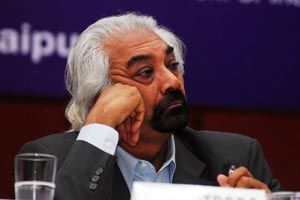Born in a remote Odisha village in 1942, Satyanarayan Gangaram (Sam) Pitroda — the man who heralded India's communication revolution — does not know his exact date of birth. Simply because his village did not have a hospital neither did it keep records of babies born. Which is why Pitroda feels the the unique identity number Aadhaar can bring in social innovation at the bottom of the pyramid.
An advisor to the Prime Minister on public information, infrastructure and innovation, Pitroda draws on his wealth of experience to dicuss issues plaguing the government like internet censorship and his vision of social innovation. Excerpts from an exclusive chat with Harsimran Julka and Paramita Chatterjee :
 How do you compare social innovation in India with that in developed nations?
How do you compare social innovation in India with that in developed nations?
The problem is the best brains globally are busy solving the problems of the rich who really don't have problems. And problems of the poor don't really get the attention they deserve. Most modern innovations that have taken place over the last 50 to 60 years have come only out of the US. Now, all US innovations focus on the top of the pyramid and they are primarily from areas such as biotech, genetics or laser technology.
Inherently they are expensive. A few days back, I was told that 60 million people in India have liver ailments. The number is higher than those battling AIDS. But AIDS gets more money and attention because it is a rich man's disease. Look at all the global institutions in the world – the United Nations, the World Bank or the IMF. All these institutions were set up by America for America after the Second World War. We need institutions for tomorrow. That's where innovation comes in.
What's been the most important change since the telecom revolution?
A very important thing has happened over the last 20 years. It is the invention of the Internet. I would say nothing like this has happened in last 15,000 years, It is as big as the invention of languages.
Do you support the idea of controlling the internet? Are we going the China way?
Nobody can control the internet. It is impossible. We cannot go the China way. Even China is not going the 'China way'. It is finding it difficult controlling the Net. The problem crops up because the older generation wants to impose its values on the younger generation. I always tell the youth not to listen to the stifling values of the old. If someone wants to want some content, who are we to control him or her. Instead, India should have its own locally relevant social networks.
Can the unique identity project be the basis of all financial inclusion programmes?
I was born in 1942 in a small little village, Titlagarh in Odisha. There were no doctors, no pharmacies, no running water, no electricity. Who is going to give you a birth certificate there? When I went to the school, I was told I was too young and I had to submit an affidavit. People are always quick to criticise.
If you have 1.2 billion people and want to build a 21st Century infrastructure, you need to build robust information systems. When you begin to organise databases of people, you realise the importance of Aadhaar.
Last year, about 7,50,000 people were released from Indian prisons. Many of them were undertrials without any identity. Aadhaar will give them an identity and allow them to say you better recognise me.
How has been your experience working in India? What more needs to be done?
I have had the best time of my life in India. In the early 1980s, Rajiv Gandhi saw that computers could play a very important role. I had a background in telecom and technology.
So, I decided to look at telecom as an instrument of change. Despite having battled cancer and two heart bypass surgeries, I wouldn't like to retire. I don't like to look at the past. I only look at the future. I don't watch any films, don't read any newspapers. Retirement would be so boring. I just enjoy working. There is so much more that needs to be done in India. Some of it may happen in my lifetime, some 20 years after I have gone. But it has to be done.
Can innovation solve India's challenges?
First, we need to find out a way to train 100 million people in vocational education. These include the truck drivers, the plumbers, the carpenters and the electricians. We have to use technology and internet to do that. Our banks give low-cost loans for higher education. But if a carpenter wants training, we don't give him a loan. What kind of system is this? Either you give them more money through schemes like the National Rural Employment Guarantee Act or empower them to do things on their own.


